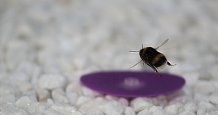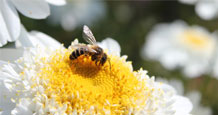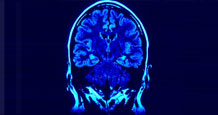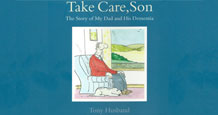Psychology news archive 2016

Tributes paid to former University of Exeter Senior Deputy Vice Chancellor
Tributes have been paid to the former Senior Deputy Vice Chancellor of the University of Exeter, Professor Paul Webley, CBE, who has passed away aged 62.

Male bumblebees leave home without looking back
Male bumblebees leave home and fly away without looking back, making no effort to remember the location of the nest, researchers at the University of Exeter have found.

Yo-yo dieting might cause extra weight gain
Repeated dieting may lead to weight gain because the brain interprets the diets as short famines and urges the person to store more fat for future shortages, new research suggests.

New mothers preoccupied with their problems can find it more difficult to respond to their babies
Mothers who have repetitive and self-focused negative thoughts about their own problems can have poorer-quality relationships with their babies, new research from the University of Exeter shows.

Should parents lie to children about Santa?
Shops are bursting with toys, mince pies are on the menu and radios are blasting out Christmas tunes – so it’s time for another festive favourite: lying to children.

Nearly £6 million for patient-centred research facility
An Exeter research facility which puts people at its heart has received nearly £6 million in funding over the next five years.

New report recommends measures to improve dementia care
Enabling people with dementia to maintain control of the decisions surrounding their care is key to avoiding isolation, according to a new report by the British Psychological Society (BPS).

Even physicists are "afraid" of mathematics
Physicists avoid highly mathematical work despite being trained in advanced mathematics, new research suggests.

New partnership between Exeter and the Center for Whale Research
The Vice Chancellor met with Professor Darren Croft and Dr Deborah Giles at the Center for Whale Research on San Juan Islands USA to talk about the work they have been doing.

Bees use multiple cues in hunt for pollen
Bees use a variety of senses and memory of previous experiences when deciding where to forage for pollen, research by the University of Exeter suggests.

Experts to use drones to discover more about killer whales
Drones will be used to discover more about the social lives of killer whales and help conserve these amazing mammals, which are at risk of extinction.

EASP summer school 2016
The University of Exeter is honoured to host the European Association of Social Psychology (EASP) summer school 2016.

Behavioural Activation as effective as CBT for depression, at lower cost
A simple and inexpensive therapy is equally as effective at treating depression as the “gold standard” of Cognitive Behavioural Therapy.

Exercise can change brain structure and reduce dementia risk
Getting regular exercise can lower the risk of cognitive decline and can even change our brain structure.

Traumatic brain injury costs £15 billion a year in the UK, says new research
Traumatic brain injury costs a total of £15 billion nationally every year and puts young people at higher risk of poor mental health and offending.

Study recruits volunteers to trial ketamine as new treatment for alcoholism
A study aiming to evaluate the use of the drug ketamine as a treatment for severe alcohol disorder is currently recruiting volunteers.

Humans could learn something from pigeons to improve their efficiency
Humans could become better at switching between tasks if they behaved more like pigeons.

Flamingo researcher wins top award
A zoo biologist from the University of Exeter has won a prestigious gold award for his research into flamingo friendships.

MPs want academic “match-making” service to help inform policy
MPs have expressed an overwhelming willingness to use a proposed new service to swiftly link them with academics in relevant areas

Dementia researchers tell their story on BBC’s Horizon
Researchers from the University of Exeter will appear on BBC Two’s flagship science strand Horizon this week.

Researcher gives evidence on young adult offenders in wake of deaths
A neuropsychologist from the University of Exeter called for better treatment of young adults when giving evidence to an influential parliamentary inquiry yesterday.

Mindfulness-Based Cognitive Therapy helps prevent depression recurrence
The largest meta-analysis so far of Mindfulness-Based Cognitive Therapy (MBCT) for recurrent depression has found that MBCT is an effective treatment option.

House of Commons showcase for University of Exeter dementia research
University of Exeter research which can help people living with early-stage dementia to manage their everyday lives and remain independent will be showcased by politicians at the House of Commons.

Dementia: “illness” label can lower mood
People who perceive dementia symptoms as an illness feel more negative than those who see it as an inevitable part of getting older, a new study indicates.

Gene could help identify psychosis risk in cannabis users
Researchers have identified a gene which can be used to predict how susceptible a young person is to the mind-altering effects of smoking cannabis.

People face subconscious urges to over-eat at this time of year
People have evolved to have subconscious urges to over-eat, and limited ability to avoid becoming obese, especially in winter, a University of Exeter study has found.

Award-winning cartoonist joins experts to discuss dementia care and support
Experts in dementia and those affected by the emotional experience of having a loved one with the condition will join an award-winning cartoonist to discuss the care and support available for those with memory loss at an event today.

Family squabbles over Christmas? Re-playing arguments in detail may be the best way to cope with them
Re-playing an argument in your head and recalling what happened in detail can be therapeutic and prevent you getting quarrels out of proportion, or becoming depressed and anxious as a result.
